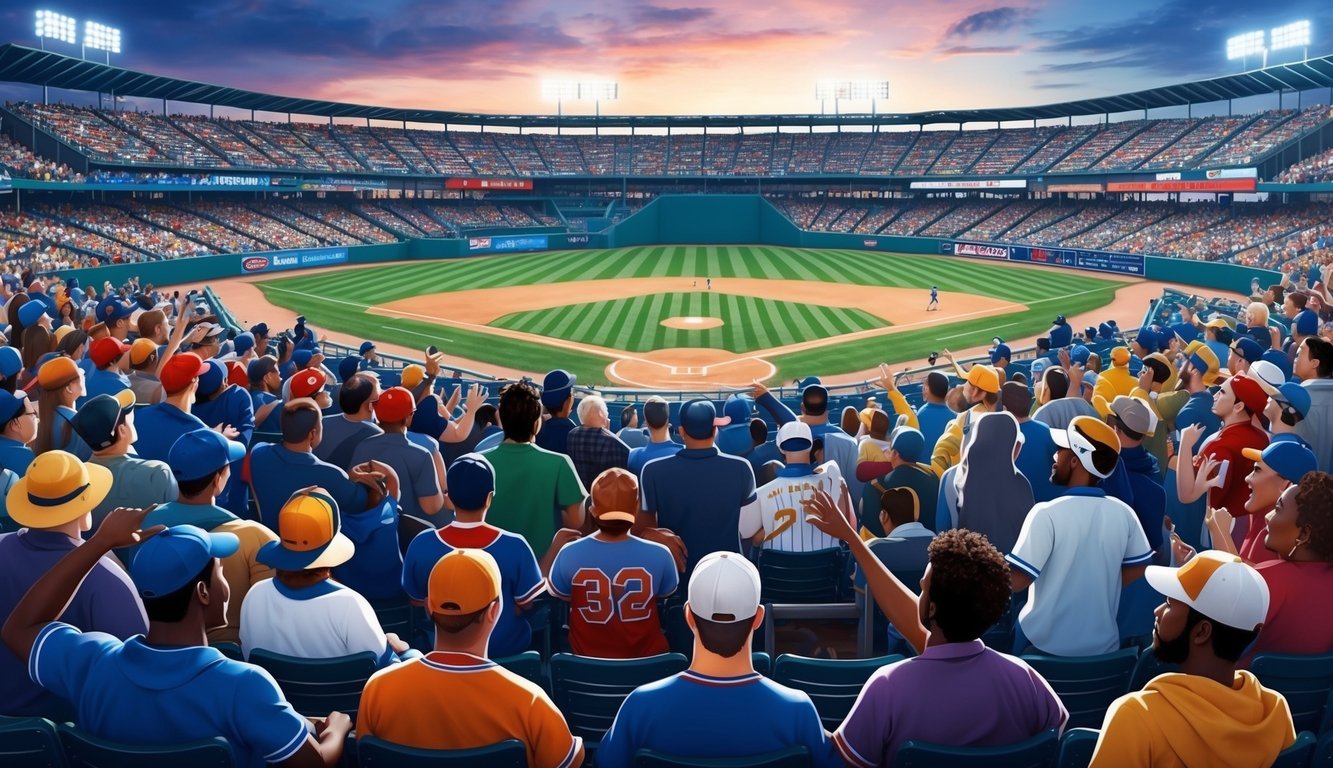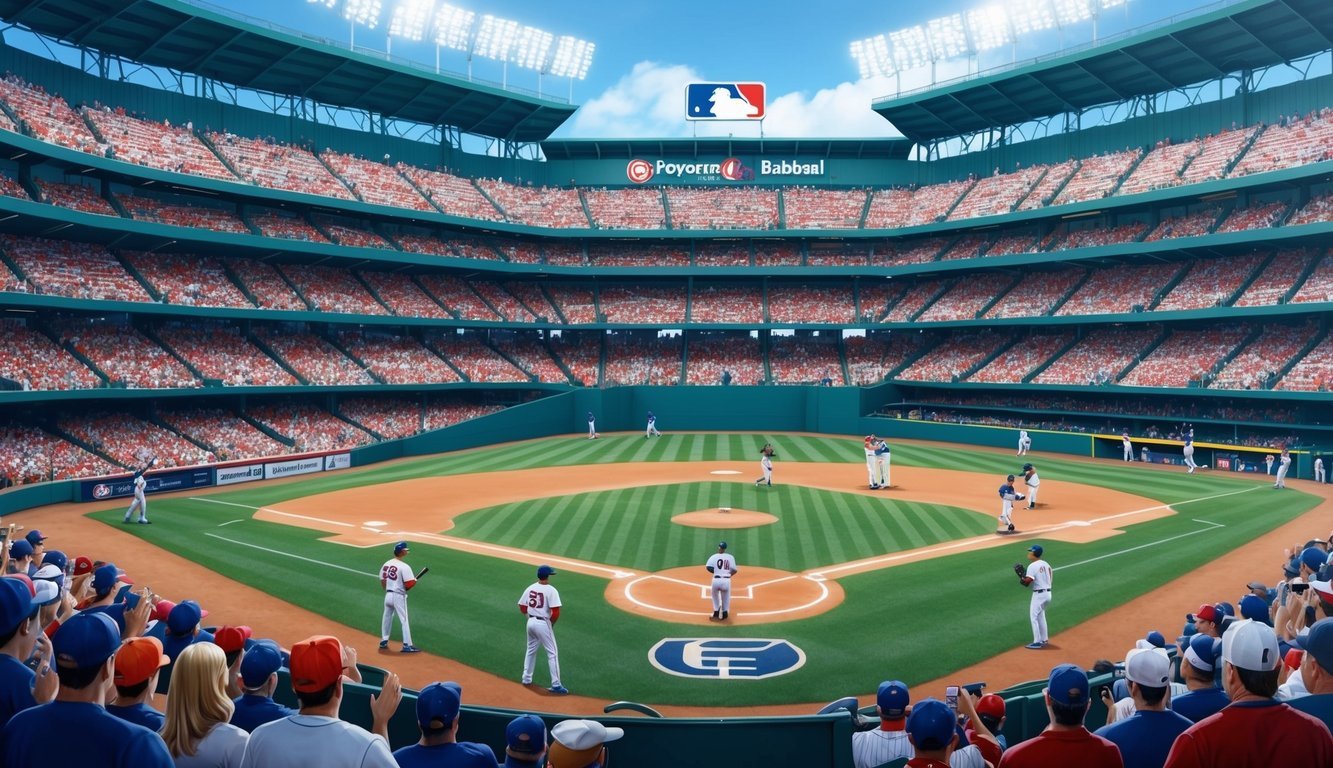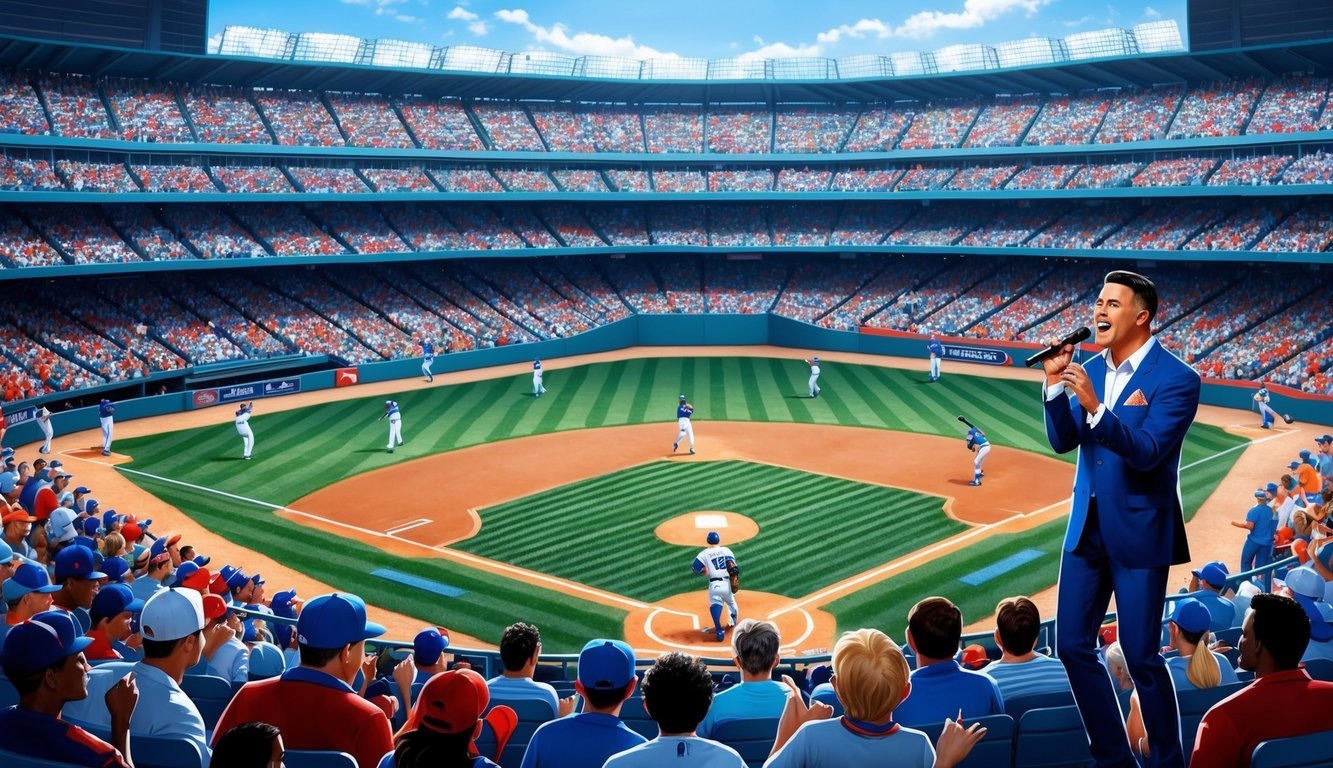Baseball songs have become an integral part of America’s pastime, weaving themselves into the fabric of the sport and the nation’s culture.
These melodies evoke powerful emotions, from nostalgia to excitement, and serve as a unifying force for fans across generations. Baseball songs capture the spirit of the game, reflecting its cultural significance and creating a shared experience for players and spectators alike.
From the iconic “Take Me Out to the Ball Game” to modern walk-up anthems, these tunes contribute to the unique atmosphere of ballparks nationwide.
They inspire team spirit, energize crowds, and create lasting memories.
The significance of these songs extends beyond the stadium, influencing popular culture and finding their way into movies, television shows, and everyday life.
As baseball continues to evolve, so too do the songs associated with it.
This musical tradition remains a vital aspect of the sport, connecting fans to their favorite teams and players while preserving the rich history of America’s beloved game.
The enduring popularity of baseball songs highlights their importance in shaping the cultural landscape of the sport and the nation.
Historical Context of Baseball Songs
Baseball songs have been an integral part of America’s pastime for over a century.
The tradition began in the early 1900s, coinciding with the sport’s growing popularity across the nation.
“Take Me Out to the Ball Game” emerged as the quintessential baseball anthem in 1908.
Written by Jack Norworth and Albert von Tilzer, this catchy tune quickly became a staple at ballparks nationwide.
As baseball’s influence grew, so did its musical repertoire.
Songs celebrating teams, players, and memorable games began to proliferate.
These tunes often reflected the social and cultural climate of their time.
The mid-20th century saw a surge in baseball-themed music.
This period coincided with the sport’s golden age and the breaking of the color barrier by Jackie Robinson in 1947.
Baseball songs have since evolved to encompass various genres, from folk and country to rock and hip-hop.
They continue to capture the spirit of the game and its place in American culture.
Many baseball songs evoke nostalgia, connecting generations of fans through shared memories and traditions.
The seventh-inning stretch, accompanied by “Take Me Out to the Ball Game,” remains a beloved ritual at ballparks across the country.
These musical tributes have played a significant role in shaping baseball’s identity as America’s national pastime.
They serve as a reminder of the sport’s enduring cultural impact and its ability to unite people through melody and lyrics.
From heartfelt ballads to lively anthems, these songs encapsulate the emotions and experiences of players and fans alike.
They celebrate the thrill of victory and the camaraderie found in the stands, where people wave their pennant baseball team flags with pride.
As a result, these musical expressions not only enhance the atmosphere of the game but also solidify the bond between generations of baseball lovers.
Baseball Songs and American Society
Baseball songs capture the essence of America’s favorite pastime, reflecting the sport’s deep-rooted influence on society.
These musical anthems bring people together and chronicle the nation’s evolving social landscape.
Uniting Fans and Community Spirit
Baseball songs foster a sense of unity and camaraderie among fans. “Take Me Out to the Ball Game” serves as the unofficial anthem of baseball, sung during the seventh-inning stretch at stadiums across the country.
This beloved tradition brings spectators together, creating a shared experience that transcends age, background, and team loyalty.
Local team fight songs further strengthen community bonds, rallying supporters around a common cause.
Songs like “Centerfield” by John Fogerty celebrate the sport’s timeless appeal, evoking nostalgia and reinforcing baseball’s place in American culture.
These musical tributes help preserve the game’s legacy for future generations.
Reflection of Social Change and Challenges
Baseball songs mirror societal shifts and address important issues. “Say Hey (The Willie Mays Song)” honored one of the game’s greatest African American players, highlighting progress in the civil rights movement.
Some songs tackle controversial topics, like steroids in baseball, reflecting public concerns about the sport’s integrity.
Others, such as “The Greatest” by Kenny Rogers, emphasize values like perseverance and resilience.
Baseball anthems have also been used to support charitable causes and unite communities during difficult times.
After 9/11, “God Bless America” became a staple at many ballparks, symbolizing national solidarity.
Musical Influence and Diverse Genres

Baseball songs span a wide range of musical styles, reflecting the sport’s broad appeal and cultural impact.
These tunes have evolved alongside popular music trends, creating a rich tapestry of baseball-inspired melodies.
Evolution of Baseball Music
Early baseball songs often took the form of upbeat marches or folk tunes.
As radio and records became popular, baseball-themed music expanded into new genres.
The 1940s and 50s saw jazz and swing interpretations of baseball themes.
Country music embraced the sport, with songs celebrating small-town teams and ballpark traditions.
In the 1960s and 70s, folk and rock artists began penning baseball anthems.
John Fogerty’s “Centerfield” became an iconic sports rock song.
Bruce Springsteen’s “Glory Days” nostalgically recalls high school baseball memories.
These tracks helped cement baseball’s place in American popular music.
Rock, Pop, and Hip-Hop Intersections
Modern baseball playlists feature a diverse mix of genres.
Rock bands continue to release baseball-themed tracks, often focusing on specific players or historic moments.
Pop artists incorporate baseball imagery into their lyrics and music videos.
Hip-hop has embraced baseball culture, with rappers name-dropping famous players and using baseball metaphors.
Some MLB teams have commissioned custom songs from local musicians.
These tracks blend team spirit with contemporary musical trends.
Baseball stadiums now feature carefully curated playlists, mixing classic baseball tunes with current hits.
This musical blend enhances the fan experience and bridges generational gaps among spectators.
Iconic Baseball Songs and Their Legacy

Baseball songs capture the heart and soul of America’s pastime.
These timeless tunes evoke powerful emotions and tell compelling stories that resonate with fans across generations.
Legendary Ballpark Anthems
“Take Me Out to the Ball Game” stands as the quintessential baseball anthem.
Written in 1908, this classic has become a beloved seventh-inning stretch tradition in ballparks nationwide.
Its catchy melody and simple lyrics perfectly encapsulate the joy of attending a game.
John Fogerty’s “Centerfield” is another iconic baseball tune.
Released in 1985, it celebrates the excitement of playing the sport and the dreams of aspiring athletes.
The song’s memorable chorus and guitar riffs have made it a staple at baseball stadiums.
Bruce Springsteen’s “Glory Days” nostalgically reflects on past baseball triumphs.
While not exclusively about the sport, its vivid storytelling and themes of youth and faded glory strike a chord with many baseball fans.
Emotional Impact and Storytelling
Baseball songs often tap into deep emotions and narratives surrounding the game.
Terry Cashman’s “Talkin’ Baseball (Willie, Mickey & The Duke)” pays tribute to baseball legends and captures the sport’s rich history.
Its verses weave together stories of great players and memorable moments.
“The Natural” by Randy Newman, from the 1984 film of the same name, evokes the magic and romance of baseball.
Its soaring orchestral arrangement mirrors the triumphant spirit of the game and has become synonymous with baseball’s most dramatic moments.
These songs go beyond mere entertainment.
They celebrate the skill, dedication, and love of baseball.
Through music, they preserve the legacy of the sport and continue to inspire new generations of fans and players.
Baseball Songs in Popular Culture and Media

Baseball songs have permeated various forms of media, becoming integral to how the sport is portrayed and remembered.
These musical tributes enhance the emotional connection between fans and the game.
Cinema and Literature
Baseball songs feature prominently in sports films, adding depth and authenticity to on-screen portrayals.
In “Field of Dreams,” the haunting melody of “Shoeless Joe from Hannibal, MO” underscores the movie’s nostalgic tone. “The Sandlot” uses “The Baseball Song” to capture the carefree spirit of youth baseball.
In literature, authors like Bernard Malamud have woven baseball songs into their narratives.
Malamud’s “The Natural” references classic tunes to evoke the golden age of baseball.
These musical inclusions help readers immerse themselves in the baseball world.
Characters and Baseball Lore
Baseball songs often immortalize legendary players and moments.
For example, “Joltin’ Joe DiMaggio” celebrates the Yankee Clipper’s hitting streak.
Meanwhile, “Willie, Mickey and the Duke” pays homage to three iconic center fielders.
These musical tributes keep baseball lore alive and pass stories from one generation to the next.
They create a shared cultural language among fans and reinforce the sport’s place in popular culture.
Films like “A League of Their Own” have introduced fictional baseball songs that become real-world hits.
This crossover between cinema and music further cements baseball’s cultural significance.
